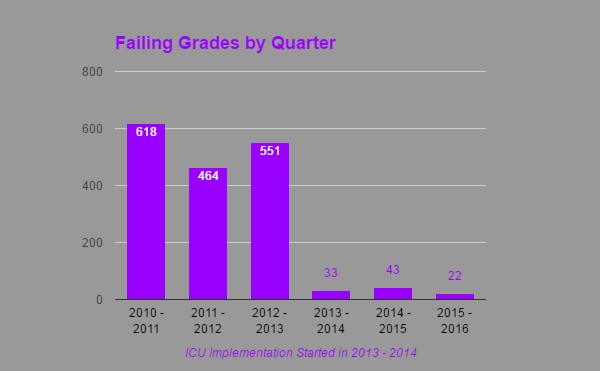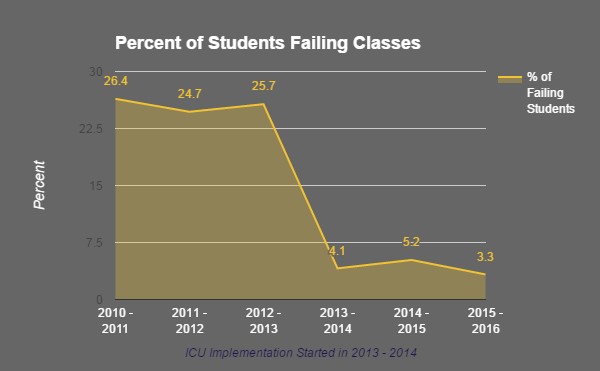Encouragement, rewards, punishment, and motivational speeches: nothing worked. It seemed that not doing an assignment was the “in” thing to do. Students’ flippant attitude when announcing, “I didn’t do my homework,” would make teachers’ blood boil. As the principal, I would be called in out of frustration to deliver an ultimatum, “If you don’t do your work, then…” I would fill in the blank with whatever sounded good that day. Things like, “You will never get a job,” or maybe, “You will end up failing this year,” would roll off my tongue year after year, and still they never flinched. “We care more than you do,” was another routine statement that was a waste of our breath. The term “Student Apathy” seemed too simple compared to the enormous real-life frustration our staff felt every single day of the school year. If this were a physical tumor, instead of our approach reducing the tumor, it seemed to grow larger and more dangerous each year. After 25 years in education, I had resigned myself to the accepted paradigm that we just cannot reach all of them.
Then we changed and all of our students completed every assignment for years. We totally changed our approach and the students dramatically improved. Notice I did not say we “added” things to our plates that were already overloaded. No, we changed our approach totally. No more speeches, no more threats, and NO MORE LETTING STUDENTS OFF THE HOOK.
Wow-what a mess! We had unintentionally declared war on student apathy without a battle plan or the infrastructure to sustain us. Nobody had explained to us “how to” get students to turn in assignments when we had been letting them off the hook for years. Just telling them they still had to complete their work just made things harder on the teachers. My incredible staff dug in and over the next several months pieced together our own “how to” and all students (yes even our toughest ones) completed every assignment routinely for years.
We are committed to defeating apathy and building a culture for learning, one school at a time.
Danny Hill
Fort Stockton Middle School English teacher Zachary Jones:
In our first year of ICU, it took many weeks before we got the ball rolling. No one was really sure of how to use it. Then, we began to realize how to use the list. Aides and student tutors would assist the students with the assignments. Teachers would get the assignments back and check them in. If the work didn’t meet standard, the student remained on ICU until it was done correctly. No class time was lost working with these students, and students began turning their work in on time. The quality of the work began to improve, and the list of ICU students began to decline.
The ICU Database has been the “game changer” for getting everyone on board. The response from parents and students has been amazing. The assignments have been rolling in. ICU is up and running great and with the database in place we are off and running!
Principal, Mel Ahart, Kirkey Middle School, Arkansas
From Jackson Junior High School in Jackson, Missouri:
Last year, we recovered 7,304 assignments that would have been zeros in the gradebook if not for the ICU Database. Not only, is that impressive in itself, we also had some of the highest state assessment scores in the area. Our Math MAP scores were 34.2% above the state average, LA MAP scores were 11.2% above the state average, and our Science MAP scores were 9.8% above the state average. Our EOC results were similar. Our Algebra I EOC scores were 31.5% above the state average and our LA I EOCs were 18.2% above the state average. These scores are due, in part, by making sure all students complete all assignments! They have to practice the material to learn the material!
ICU is more than just putting students on a list. It gets the parents involved, it gets coaches involved. Everyone in the building becomes a stakeholder to help that student get their practice done to get them to learn the standards. Besides the list, our building has incorporated several interventions to help students get the help they need. We have tutoring available before school and afterschool, as well as during the school day in their advisory class! We have a lifeguard that talks to each student on the list each day and makes a plan with them to get help and to get their work done and off the list. We have a focus group that meets once a month to reevaluate our interventions and strategies to make them as efficient as possible. And my favorite part is our Blitz days; on these days students who need help can get help and students who have all A’s and B’s get to go to reward areas (movie room, game room, sports zone, etc).
Implementing ICU has not only made our students better learners and more responsible citizens, but it has made our teachers be the best they can be! It is so refreshing to hear teachers talk about those students that needed help, got the help they needed, and seeing that “lightbulb”! Sometimes junior high students are hesitant to ask for help, but with ICU it shows them the strategies and interventions available to them. Just this week, I was helping a student in our afterschool academic tutoring and heard a student say, “I’m so glad Mr. Moss made me come to academic lab to get help. I totally understand this better. I wish I would’ve understood how it worked earlier!”
Jackson Junior High continues to build a culture for student learning and success where every adult pulls for every student everyday…and every student knows it!
It’s a fundamental principle of learning: You perform a task correctly or incorrectly and receive feedback. Though it may be hard to hear at times, especially if you performed a task incorrectly, you learn. We are constantly searching for feedback in our relationships — from our bosses, parents, friends, etc. — and the student-teacher relationship is no different. That’s why it is critical that you provide accurate feedback to your students.
Why Inflexible Teaching Practices Hurt More Than Help
Take this example: Harry turns in a late homework assignment. His score is exceptional, but the “policy” is that late work means 10 points off your grade. The teacher knows that Harry retained the material, but his final grade does not reflect his learning. This type of inaccurate feedback is dangerous to your students and counter-productive.
Take another example on the opposite end of the spectrum: Elizabeth consistently scores high grades but not 100s, so to increase her chances of reaching the top of the class, she regularly brings materials such as glue, paper, and markers into class for extra points. She ends up at the top of the class, but she scores low in science on her ACT. Because of her score, she must take a remedial science class in her first year of college. Did her grades reflect true learning, or were they a shadow of a grade?
Do Grades Truly Reflect Student Aptitude?
The same goes for averaging student grades, which Dr. Doug Reeves calls a “toxic grading practice.” An average grade is, essentially, equal to no grade. It does not accurately reflect what the student learned, so why do it? It is a popular tactic in schools and one that leaves students with a false sense of accomplishment.
By providing accurate feedback, you are extending students the best gift you can offer as a teacher: true learning. And, when those students see what they have truly learned, minus the false grading, they adapt and become part of a healthy school culture.




 We are excited to announce that Jackson Junior High School will receive the Brick House Achievement Award for building an outstanding culture for student success and improved learning. This elite award is named after the book Brick House: How to Defeat Student Apathy by Building a Brick House Culture, by Danny Hill. Danny is a nationally recognized author and school consultant who has a network of hundreds of schools across the nation. Danny states, “The thing that sets Jackson Junior High apart from other schools is their relentless approach to improving each year. They are never satisfied.”
We are excited to announce that Jackson Junior High School will receive the Brick House Achievement Award for building an outstanding culture for student success and improved learning. This elite award is named after the book Brick House: How to Defeat Student Apathy by Building a Brick House Culture, by Danny Hill. Danny is a nationally recognized author and school consultant who has a network of hundreds of schools across the nation. Danny states, “The thing that sets Jackson Junior High apart from other schools is their relentless approach to improving each year. They are never satisfied.”